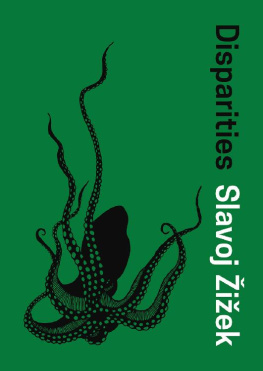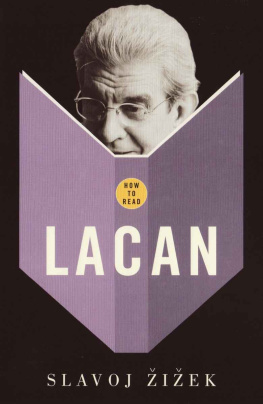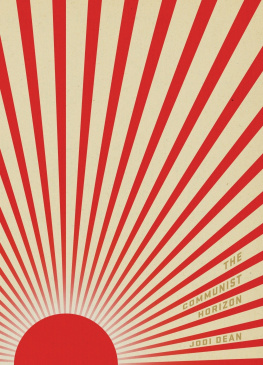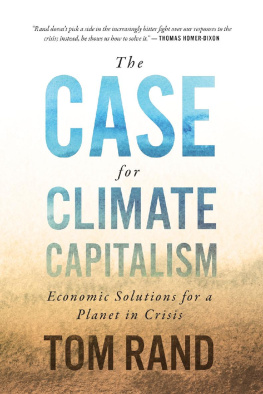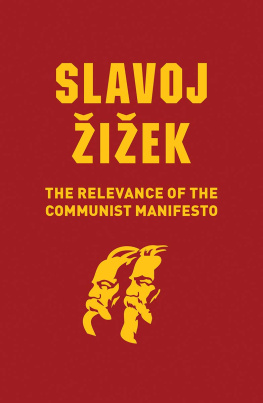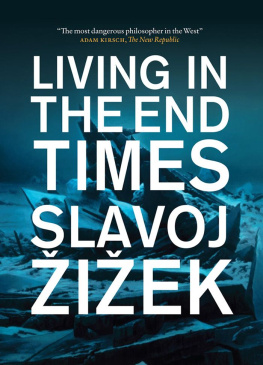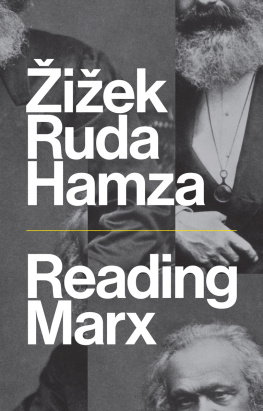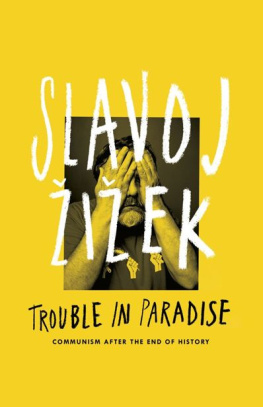
Dedication
To Alain Badiou, my absolute friend.
A Left that Dares to Speak Its Name
Untimely Interventions
Slavoj iek
polity
Copyright Slavoj iek 2020
The right of Slavoj iek to be identified as Author of this Work has been asserted in accordance with the UK Copyright, Designs and Patents Act 1988.
First published in 2020 by Polity Press
Polity Press
65 Bridge Street
Cambridge CB2 1UR, UK
Polity Press
101 Station Landing
Suite 300
Medford, MA 02155, USA
All rights reserved. Except for the quotation of short passages for the purpose of criticism and review, no part of this publication may be reproduced, stored in a retrieval system or transmitted, in any form or by any means, electronic, mechanical, photocopying, recording or otherwise, without the prior permission of the publisher.
ISBN-13: 978-1-5095-4119-5
A catalogue record for this book is available from the British Library.
Library of Congress Cataloging-in-Publication Data
Names: iek, Slavoj, author.
Title: A left that dares to speak its name : 34 untimely interventions / Slavoj iek.
Description: Cambridge, UK ; Medford, MA : Polity, 2020. | Includes bibliographical references. | Summary: With irrepressible humour Slavoj iek dissects our current political and social climate, discussing everything from Jordan Peterson and sex unicorns to Greta Thunberg and Chairman Mao. This is ieks attempt to elucidate the major political issues of the day from a truly radical left position-- Provided by publisher.
Identifiers: LCCN 2019027646 (print) | LCCN 2019027647 (ebook) | ISBN 9781509541171 (hardback) | ISBN 9781509541188 (paperback) | ISBN 9781509541195 (epub)
Subjects: LCSH: Right and left (Political science) | Communism. | Social history--21st century. | World politics--21st century.
Classification: LCC JA83 .Z59 2020 (print) | LCC JA83 (ebook) | DDC 320.53/2--dc23
LC record available at https://lccn.loc.gov/2019027646
LC ebook record available at https://lccn.loc.gov/2019027647
The publisher has used its best endeavours to ensure that the URLs for external websites referred to in this book are correct and active at the time of going to press. However, the publisher has no responsibility for the websites and can make no guarantee that a site will remain live or that the content is or will remain appropriate.
Every effort has been made to trace all copyright holders, but if any have been overlooked the publisher will be pleased to include any necessary credits in any subsequent reprint or edition.
For further information on Polity, visit our website: politybooks.com
Introduction: From the Communist Standpoint
This book brings together my (substantially rewritten) most recent interventions in the public media. They cover the entire panoply of topics that aroused public attention, from economic turmoil to the struggle for sexual emancipation, from populism to political correctness, from the vicissitudes of Trumps presidency to the ongoing tensions in and with China, from ethical problems raised by sexbots to the Middle East crisis. The concluding supplement contains fragments from two polemics I was engaged in. The collected interventions are untimely because their premise is that only a communist standpoint provides the appropriate way to grasp these topics. So why communism?
Signs abound that our global situation calls increasingly for such a standpoint. Apologists of the existing order like to point out that the dream of socialism is over, that every attempt to realize it turned out to be a nightmare (just look at what goes on in Venezuela!). However, at the same time, signs of panic grow everywhere: how are we to deal with global warming, with the threat of total digital control over our lives, with the influx of refugees? In short, with the effects and consequences of this same triumph of global capitalism? There is no surprise here: when capitalism wins, its antagonisms explode.
On the one hand, signs of anti-Enlightenment madness multiply everywhere. In Koszalin, a city in northern Poland, three Catholic priests have burned books they say promote sorcery, including one of the Harry Potter novels, in a ceremony they photographed and posted on Facebook: they carried the books in a large basket from inside a church to a stone area outside, where the books were set alight as prayers were said and a small group of people looked on. This is also a way to fight the remnants of Western colonialism, and the book burning in Poland can be viewed as a way to fight Western commercialized consumerism. The conjunction of these two examples, one from Hindu India and the other from Christian Europe, demonstrates that we are dealing with a global phenomenon.
While we are sinking deeper and deeper into this madness (which coexists easily with a thriving global market), the real crisis is approaching. In January 2019, an international team of scientists proposed a diet it says can improve health while ensuring sustainable food production to reduce further damage to the planet. The planetary health diet is based on cutting red meat and sugar consumption in half and upping intake of fruits, vegetables and nuts.
Communist interventions are needed because our fate is not yet decided not in the simple sense that we have a choice, but in a more radical sense of choosing ones own fate. According to the standard view, the past is fixed, what happened happened, it cannot be undone, and the future is open, it depends on unpredictable contingencies. What we should propose here is a reversal of this standard view: the past is open to retroactive reinterpretations, while the future is closed since we live in a determinist universe. This doesnt mean that we cannot change the future; it just means that, in order to change our future we should first (not understand but) change our past, reinterpret it in such a way that opens up toward a different future from the one implied by the predominant vision of the past.
Will there be a new world war? The answer can only be a paradoxical one. If there is to be a new war, it will be a necessary one. This is how history works through weird reversals as described by Jean-Pierre Dupuy: If an outstanding event takes place, a catastrophe, for example, it could not not have taken place; nonetheless, insofar as it did not take place, it is not inevitable. It is thus the events actualization the fact that it takes place which retroactively creates its necessity. And exactly the same holds for a new global war: once the conflict explodes (between the US and Iran, between China and Taiwan), it will appear inevitable, that is to say, we will automatically read the past that led to it as a series of causes that necessarily caused the explosion. If it does not happen, we will read it in the same way that today we read the Cold War as a series of dangerous moments where the catastrophe was avoided because both sides were aware of the deadly consequences of a global conflict. (So we have today many interpreters who claim that there never was an actual danger of World War III during the Cold War years, that both sides were just playing with fire.) It is at this deeper level that communist interventions are needed.
Jrgen Habermas is often described as the state philosopher of the German (European even) liberal Left no wonder, then, that about two decades ago, the conservative Spanish Prime Minister, Jos Mari Aznar, even formally proposed that Habermas be declared the Spanish (and European) state philosopher (on account of Habermass idea of constitutional patriotism, a patriotism grounded in emancipatory values embedded in a constitution rather than in ones own ethnic roots). While disagreeing with Habermas on many points, I always found the role he was not afraid to play that of a critical supporter of, participant in even, power honorable and necessary, a more-than-welcome retreat from basically irresponsible politics at a distance.
Next page

